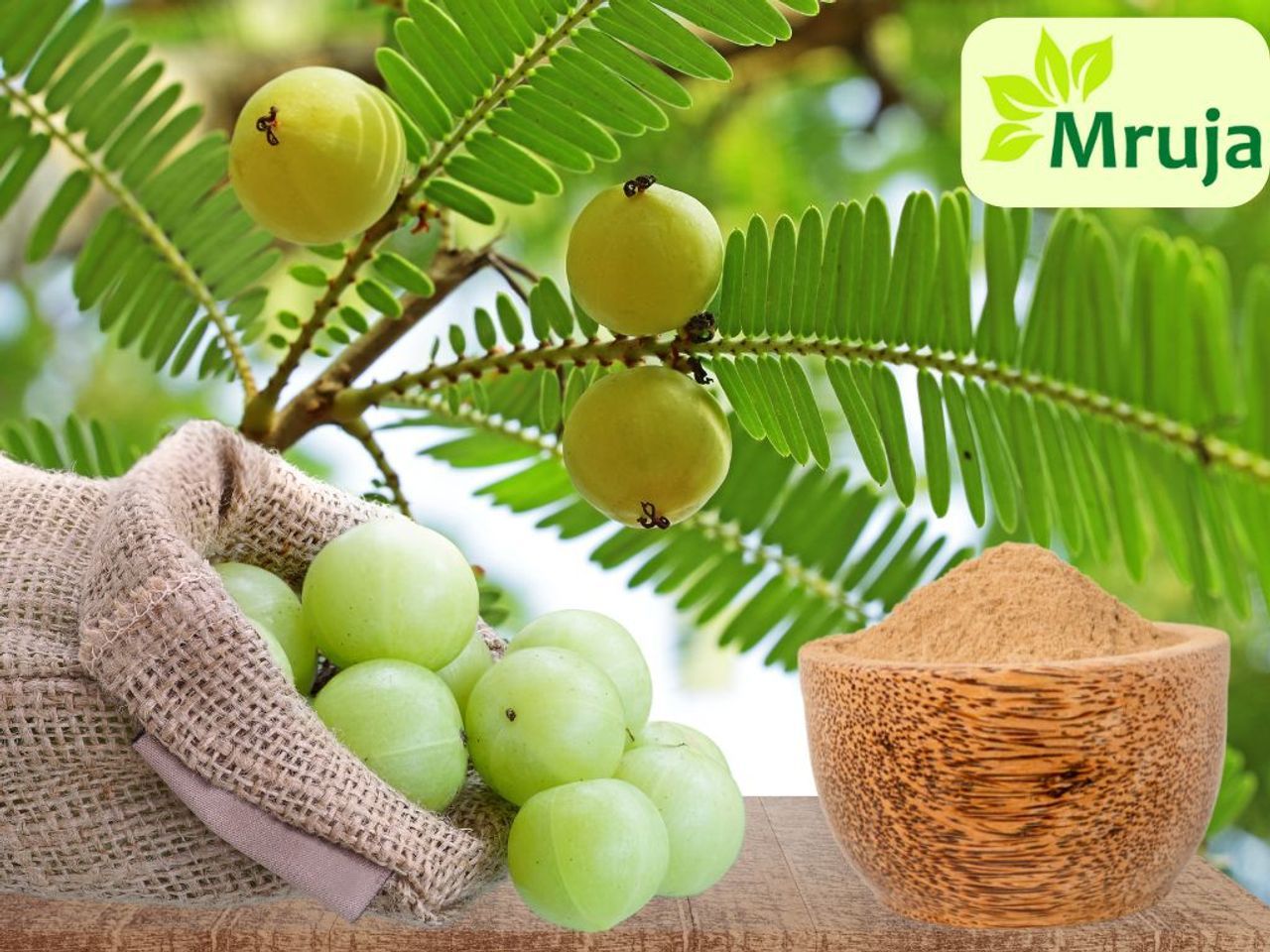Amalaki (Emblica officinalis): Ayurvedic Properties and Uses

Amalaki, commonly known as Indian gooseberry or Amla, is a revered fruit in Ayurveda. Its botanical name is (Emblica officinalis or Phyllanthus emblica), and it belongs to the Phyllanthaceae family. The fruit is highly prized in Ayurvedic medicine for its potent rejuvenating and healing properties. It is commonly consumed fresh, dried, or in supplement form and is a central ingredient in many Ayurvedic formulations like Chyawanprash and Triphala.
Ayurvedic Properties
Amalaki is considered a Rasayana (rejuvenator) in Ayurveda and is described as having the following properties:
1. Rasa (Taste): Primarily sour (Amla), but also contains all other tastes except salty – sweet (Madhura), bitter (Tikta), pungent (Katu), and astringent (Kashaya).
2. Guna (Quality): Light (Laghu) and dry (Rooksha).
3. Virya (Potency): Cooling (Shita).
4. Vipaka (Post-digestive effect): Sweet (Madhura), which contributes to its nourishing qualities.
5. Dosha Balancing: It pacifies all three doshas – Vata, Pitta, and Kapha. Due to its cooling effect, it is particularly effective in balancing Pitta but can be used across all constitutions because of its versatile nature.
Health Benefits and Uses in Ayurveda
1. Rejuvenation and Longevity:
Amalaki is renowned for its rejuvenating (Rasayana) properties, enhancing vitality and promoting longevity. Regular use strengthens tissues, boosts immunity, and slows down the aging process.
2. Antioxidant and Immune Support:
It is one of the richest natural sources of Vitamin C, which gives it strong antioxidant properties. Amalaki helps neutralize free radicals, supports immune function, and protects the body from oxidative stress. It strengthens the immune system and increases resistance to infections.
3. Digestive Health:
Amalaki promotes healthy digestion by improving Agni (digestive fire) without aggravating Pitta. Its light and sour properties help cleanse the digestive system, relieve constipation, and support overall gut health. It is also beneficial for managing hyperacidity and ulcers due to its cooling effect.
4. Respiratory Support:
It is often used in the treatment of respiratory conditions such as cough, asthma, and bronchitis. Amalaki’s cooling and anti-inflammatory properties soothe the respiratory tract, reducing inflammation and congestion.
5. Skin and Hair Care:
Regular consumption of Amalaki improves skin texture, reduces pigmentation, and delays the appearance of wrinkles. Its antioxidant properties make it an effective anti-aging agent. For hair, it strengthens the roots, reduces hair fall, and prevents premature graying.
6. Heart and Circulatory System:
Amalaki promotes cardiovascular health by lowering cholesterol levels and improving circulation. It strengthens the heart muscles, regulates blood pressure, and reduces the risk of heart diseases.
7. Blood Sugar Regulation:
Amalaki is known to help regulate blood sugar levels, making it beneficial for managing diabetes. Its cooling and nourishing effects support the pancreas and enhance insulin sensitivity.
8. Eye Health:
Amalaki is traditionally used to improve vision and treat eye disorders such as conjunctivitis and cataracts. Its high vitamin C content, along with other antioxidants, helps maintain eye health and prevent damage caused by free radicals.
9. Mental Health and Cognitive Function:
Amalaki’s Rasayana properties also extend to mental well-being. It enhances cognitive functions, supports mental clarity, and improves concentration. In Ayurveda, it is considered a *medhya* (brain tonic) that can help reduce stress and anxiety.
Traditional Ayurvedic Formulations with Amalaki
1. Chyawanprash:
A classical Ayurvedic preparation where Amalaki is the primary ingredient. It is a potent immunity booster and rejuvenative tonic.
2. Triphala:
A well-known Ayurvedic formulation made of three fruits: Amalaki, Haritaki, and Bibhitaki. It is widely used for digestive health, detoxification, and improving bowel regularity.
3. Amalaki Rasayana:
This is a specific rejuvenation therapy that uses processed Amalaki to boost vitality, immune function, and longevity.
Conclusion
Amalaki (Emblica officinalis) is a remarkable herb in Ayurveda, celebrated for its wide array of therapeutic benefits. Its versatility makes it suitable for almost all body types and conditions, offering profound rejuvenation, disease prevention, and treatment benefits. With its long-standing history in Ayurveda, Amalaki remains one of the most trusted and effective natural remedies for maintaining health and longevity.
References
- Dash, V.B., & Kashyap, L. (1980). *Materia Medica of Ayurveda: Based on Ayurveda Saukhyam of Todarananda. Concept Publishing Company.
- Singh, S., & Sharma, V. (2011). *Pharmacological basis for the role of emblica officinalis in treatment of anemia. Pharmacognosy Reviews, 5(9), 96-98.
- Sharma, P.V. (1998). Dravyaguna Vijnana (Vol. II). Chaukhamba Publications.



